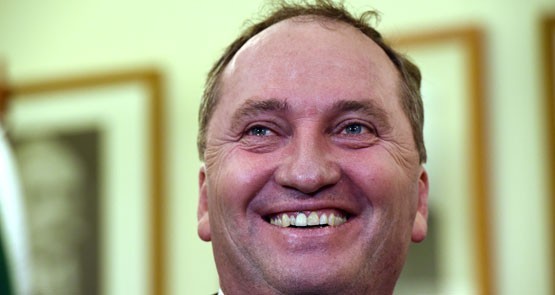
There’s fresh controversy brewing around Chinese investment in Australian agriculture involving two high-profile cases: the planned sales of S. Kidman and Co, Australia’s biggest portfolio owner of cattle stations, and a blue-chip Tasmania dairy property being sold by New Zealand group Van Diemen’s Land Company to Moon Lake Investments, a company owned by Chinese businessman Lu Xianfeng.
That issue has now come into even sharper focus with the elevation of Barnaby Joyce to the leadership of the federal parliamentary National Party. Joyce, a long-time critic of China “buying up the farm” has opted to retain the Agriculture portfolio as he takes on the role of Deputy Prime Minister.
Joyce is the leading critic of Chinese agricultural investment, and with the sale of these two significant properties, the freshly shaped Turnbull government faces a very early test, especially with Malcolm Turnbull strongly considering his first visit to China as Prime Minster in April, according the growing buzz in corporate circles.
The Nationals, with the support of their not-so-unlikely bedfellows the Greens, won a concession from the Liberal Party to cut the level of Chinese investment that requires approval by the Foreign Investment Review Board to anything over $15 million in farmland and over $55 million in agribusiness as part of a deal to support the China-Australia Free Trade Agreement.
The sale of Kidman has been in process since April last year, despite infighting by descendants of cattle baron Sidney Kidman over the plan. Kidman’s properties included Anna Creek in South Australia, the world’s largest cattle station, and the company ships 1.3% of Australia’s boxed beef exports.
Top four accounting and consulting group Ernst & Young is running the sale process. Half a dozen companies expressed interest, almost exclusively from China or Hong Kong — the latter most likely fronts for Chinese money. The auction was won by Shanghai Pengxin — a privately owned conglomerate with interests in supermarkets and hotels in China — for $350 million.
Crikey has learned that Pengxin was in talks with one of Australia’s biggest feedlot owners about fattening the cattle bred on Kidman’s properties for eventual slaughter and shipping to China.
Nothing to see here for FIRB? Well, Ernst & Young thought so, telling Pengxin that it would be no problem with FIRB, according to people involved in the sale process.
After all, Australia is selling increasing volumes of beef to China, and the significant investment needed to restore many of the Kidman properties means not only are no jobs lost, more are created.
So the Chinese company was rocked when Treasurer Scott Morrison knocked back the deal on “national interest” grounds. The sale could only go ahead with Anna Creek carved out, as it overlapped with the apparently sensitive Woomera military base. It’s worth noting that Joyce has publicly opposed the sale since August. By November it was well known that Nationals leader Warren Truss would retire at the next election and Joyce was his logical successor. Coincidence, or was there a deal?
In hindsight it was politically naive advice indeed for EY to give, given Kidman’s “iconic status” and the fact Joyce has been at the forefront of the campaign since he declared, when opposition finance spokesman, that all Chinese state-run companies should be barred from making investments in Australia. It cost him his job then, but he will be feeling more comfortable about his role now.
“[The Australian people] want greater protections on who owns what, and a greater understanding of who owns what, and the most sensitive area they look at is the actual ground we stand on,” Joyce said in November.
Quite. Transparency in Australia has become increasingly limited, and governments these days feel no obligation whatsoever to tell taxpayers on what they are spending their money until the government is good and ready. Perhaps Joyce is committed to changing this, but perhaps best not to hold one’s breath.
There is also a legitimate food security argument around foreign investment, especially when the consequences of global warning on Australia are predicted to shrink even further the arable land in the country.
The “sell everything” line is that Australia is a capital importing economy, and we need the investment — athough apparently not when Liberal Party donor Lindsay Fox is around. As Pengxin was back at the books, finalising a fresh bid for an Anna Creek-less Kidman, out of the blue came the trucking magnate’s Linfox.
It’s worth noting that Fox was one of a handful of wealthy donors who dodged the $5000 party funding cap via donations to local governments. Until its surprise bid, Fox’s logistics and property group Linfox had not previously shown even a glimmer of interest in Kidman.
Naturally, Kidman will want the full sale price, rather than a lower figure for the group with Anna Creek excised, and media reports have noted that any less than $300 million may result in the sale being pulled.
Crikey understands Pengxin is already looking at other cattle assets of similar size to Kidman. So Joyce and Morrison may well just be kicking the can down the road — the one that says “Australia is open for business”.








Don’t you love the smell of chickens coming home to roost?
I didn’t think that Chinese people were allowed to take more than fifty thousand dollars out of their country anyway, there has been a suggestion of money laundering while they were busy buying up lots of melbourne’s real estate a while ago.
A couple of fake Rolex and the promise of board seats in the future might prove to be convincing.
Esp. if Tony Windsor decides to run.
It may be of value to examine the ethical behaviour of Chinese businesses in Africa. Will the Chinese treat us with any more respect?
I’m with Barnaby Joyce on this one. No nation sells its critical assets to foreign interests. Common sense tells you that to sell the majority of farms to China will have consequences. One gone, hard to ever get back.